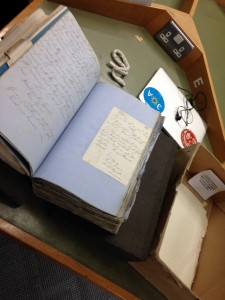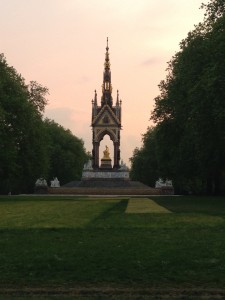By: Kristin Brig
Archival research is a sensual experience – the smell of aged paper, the touch of threadbare book covers, listening to scratching pencils and pulling documents out of boxes and covers. With the help of the School of Humanities and Social Sciences, I was able to engage my senses in such a way as I performed research for my masters thesis in three of London, England’s biggest archives: the British Library, the Wellcome Library, and the UK National Archives. I used the opportunity to pour over document collections, notably the Royal Commission on Vaccination depositions located at the Wellcome and the Colonial Office records located at the National Archives, in order to collect primary sources for my thesis on vaccination policy and regulation in late nineteenth- and early twentieth-century British Africa.
Each day I left my flat, grabbed a coffee from a café next door, and headed to an archive. I spent the first week at the Wellcome, taking one day to visit the British Library. The following week I devoted to the National Archives. Doing archival research requires a receptive mind-set; even though online catalogues contain descriptions of materials, they usually offer little more than a short paragraph on the general theme of each collection or document. Instead of knowing exactly why I was searching for, I instead allowed the documents to guide my research. As I scanned a document for key words, I would occasionally stop and read bits of said document. If I found a passage with potential, I snapped a picture of the page and subsequent related pages. Yet purely from the pieces of information I gleaned from first glances, I saw different paths my thesis could take, patterns or anecdotes from South African, Ugandan, and Kenyan district surgery that I could tell were somehow connected. I took pictures of 600 documents at the Wellcome, 19 at the British Library, and 358 at the National Archives, presenting me with a total of 977 pages of primary sources for my thesis.
Today, I have read through close to 950 pages of those sources. I now know that without this research trip, my thesis for this upcoming academic year would not be possible. Many of the documents I digitized for my personal benefit would not otherwise be available to me here in Charleston.
At the same time, simply traveling living abroad was an experience in and of itself. At the end of a full day at the archives, I usually met up my travelling friend and fellow history graduate student, Hope Reilly, to go out to dinner at pubs and ethnic restaurants near our flat. Together, we also visited museums on the weekend, took evening walks in places such as Hyde Park and St. James Park, and even took a train to Edinburgh, Scotland for the May 28 Bank Holiday, when London’s archives were largely shut. We took advantage of our time outside the archives, choosing cultural experiences over watching television in the room to further broaden our academic sensibilities.
In the end, one memory will stay with me as I begin my thesis this fall. I spent the Saturday afternoon of our one weekend in Gordon Square, the former haunt of Virginia Woolf’s Bloomsbury Group. I purchased a coffee from the garden stand and sat in a sunny patch of grass with my computer. As I read through and organized my first week’s collection of primary sources, I paused a moment to take in my surroundings. Groups of university students on the grass chatting about their exams. Older couples sitting peacefully on benches together. Birds chirping from the trees encircling the garden.
And I realized how great an opportunity I had been given to live and work in such a beautiful city for two weeks.
Kristin is pursuing her M.A. in history. The School of Humanities and Social Sciences funded a portion of her summer research trip to London. Students, like Kristin, are given experiential learning opportunities through our Dean’s Excellence Fund. Learn more.

